The Greek Church honors the Lord’s forerunner today. It is one of six times the Church recalls the liturgical memory of the Forerunner. St John the Baptist has achieved quite a place in our theology. We recall that John is the cousin of the Lord (Elizabeth’s cherished son); he was a member of an ascetic group; he’s known as a prophet; he preached the coming of the Messiah; he “spoke truth to power”, and lost his head as a consequence.
“The memory of the righteous is celebrated with hymns of praise, but the Lord’s testimony is sufficient for you, O Forerunner. You were shown in truth to be the most honorable of the prophets, for you were deemed worthy to baptize in the streams of the Jordan Him whom they foretold. Therefore, having suffered for the truth with joy, you proclaimed to those in hell God who appeared in the flesh, who takes away the sin of the world, and grants us great mercy.” (Troparion, Tone 2)
While the Roman Church has a different way of honoring the saints, the Byzantine Church has its own and immediately following the Theophany, the commemoration of Jesus’ baptism, we have John the Baptist, the holy man inextricably connected with the Theophany. And this is a critical point: saints, especially the prophets, need to be located on the liturgical calendar that closely relate to the Paschal Mystery or to the season preparing for a great feast.
What is the message of the Baptist? Why must we attend to his announcement? St. John the Baptist announces the coming of the one who would baptize with fire and the Spirit, proclaiming a new life for humanity. We believe that the Baptist precedes Jesus into Hades, the Kingdom of Death, to announce liberation to the souls held there. He is, therefore, the model of sanctity manifesting not his own glory. The controlling idea: the Son of God is the center of our attention. As a parenthetical idea, John’s image was always painted in scenes where the artist would be trying to communicate the virtues of religious life. So, at point in art history you would not see a St Pachomius or a John Cassian or a Francis of Assisi without the Baptist nearby.
John tells us three important points:
“Behold, the Lamb of God, who takes away the sin of the world. He is the one of whom I said, ‘A man is coming after me who ranks ahead of me because he existed before me’” (John 1:29-30). “Repent, for the kingdom of heaven is at hand” (Matthew 3:2). AND “He [Jesus] must increase; I must decrease” (John 3:30).
The Church proposes the Holy Forerunner to us today as a paradigm of what we need to do: we must “prepare the way of the Lord,” by a similar ascetical struggle John engaged in. This ascetically struggle is possible for all of us, even in small ways. The Church as a good parent that the discipline of our souls and bodies can be filled with Jesus Christ. Here we believe that to be a faithful Christian also means imitating John the Baptist. To venerate John in body and spirit is not an easy task, yet must be undertaken if we are to be in heaven with the Holy Trinity.
St John the Baptist, pray for us.
